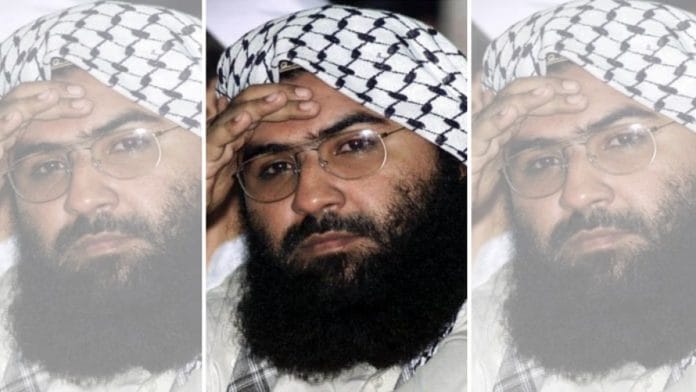New Delhi: The eulogy was strangely erotic, written by jihad commander Masood Azhar Alvi for his nephew, Talha Rashid, who was slain in combat in Kashmir in 2017. “The martyr’s sins are forgiven when the first drop of his blood falls,” he wrote, “and he is spared the agony of the grave, the terrors of the day of judgment; he is married to seventy-two virgins; his family granted God’s mercy. His head wears a crown of honour, any one of the gems studding it more valuable than all this world.”
From his Inter-Services Intelligence-provided safehouse, the Jaish-e-Mohammed chief has now issued directions, urging his followers to respond to India’s air strikes by following Talha’s steps. The words are of political significance: Azhar lies at the heart of powerful clerical networks in southern Punjab in Pakistan, which have a deep influence in poor communities, parts of the urban middle class, and sections of the military rank-and-file.
The Government of Pakistan claims Azhar escaped from house arrest in 2019, and made his way to Afghanistan. Those claims are denied by the Islamic Emirate of Afghanistan. The latest letters, however, make clear he is in close contact with events in his homeland.
Large numbers of Fidayeen groups of the JeM have carried out attacks in Kashmir, as well as across the rest of India—from the Akshardham Temple to the Jammu & Kashmir legislative assembly, and Parliament House.
Two Indian intelligence officials ThePrint spoke to said that in the event of a long-drawn war, those groups would be brought into play to harry Indian military movement along the strategically vital highway linking Pathankot with Jammu, and on to the Kashmir valley. They also pointed to the risk of escalating Fidayeen attacks after a possible ceasefire.
Following the end of the Kargil war, the JeM and LeT (Lashkar-e-Taiba) intensified operations, killing a record 763 military and police personnel in 1999, another 788 in 2000, and 883 in 2001, the year before a ceasefire was brokered on the Line of Control, according to the South Asia Terrorism Portal. Those fatalities far exceeded India’s losses in the Kargil war itself.
“The real worry is that the heavy firing on the LoC pushes our troops to take defensive cover, which makes infiltration much easier,” a senior Jammu and Kashmir Police officer told ThePrint. “There are already worrying signs that infiltration has taken place through Gulmarg and Rajouri.”
In his 8 May letter, Azhar writes: “It has been 36 hours since India’s cowardly and murderous attack, and people are still awaiting retribution. The Indian jets that were downed were not revenge or retribution. The aircraft did what they had come to do. They could not be stopped. Technology these days makes that problematic. I don’t want to blame anyone. The attack happened. Now, retaliatory action is vital.”
He adds that if there is no retaliation, the alternative would be “utter destruction—a destruction which will be unleashed upon by nature”.
“This destruction descends on those Muslims who forsake their faith. The undoing of the Tartars was that they got scared and ended up being annihilated. Those who held their ground alone survived. For God’s sake, understand the Quran and save your country. Whoever decides to initiate a retaliatory action will be the true hero and leader of this country, and will have the respect of the world on the day of judgment.”
He further writes: “We are not asking for revenge for the blood that was spilt. This was very pure and priceless blood. This blood has already started taking its revenge, and the inheritors of this blood understand their responsibilities.”
Invoking the ‘martyrs’
An earlier missive, issued on 7 May, had pointed to personal losses, saying, “The home in which we lived had four children, aged between four and 10, and they have all moved to Paradise together. Their parents are alone now. This journey to Paradise is reserved for those Allah loves the most. Their time of departure was destined, but they have been given eternal life. This action of India has broken all limits. Nobody on his side should hope for mercy. The destroyed dome of the Jama Masjid will rain such hell that will be remembered by many generations to come.”
Although Azhar’s JeM occupies a limited space in Pakistani Punjab’s religious landscape, it is enmeshed with a broader network of right-wing groups, like the Tehreek-i-Labbaik Pakistan and the Tablighi Jama’at. These networks of organisations have often succeeded in mounting pressure on Prime Minister Shehbaz Sharif’s government and the army itself.
(Edited by Mannat Chugh)
Also Read: Fidayeen factories of Lashkar-e-Taiba in Muridke, Jaish in Bahawalpur targeted in Operation Sindoor







Tough times lie ahead.
Azhar must be exterminated. India must opt for all out war with Pakistan. Let this be a fight to the finish.
The scourge of Islamic terrorism has to end. Islam and it’s derivative terrorism are the biggest possible threat to humanity’s progress.